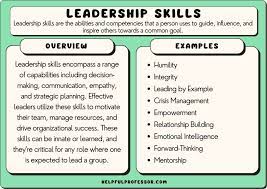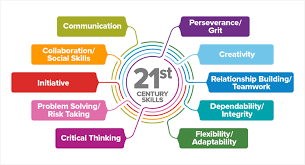The Key to Success: Strong Leadership Skills
Effective leadership is a crucial component of success in any organization. Strong leadership skills not only drive productivity and innovation but also inspire and motivate team members to achieve their full potential. Whether you are a seasoned executive or a new manager, developing strong leadership skills is essential for personal growth and organizational success.
Characteristics of Strong Leaders
Strong leaders possess a unique set of characteristics that set them apart. These include:
- Vision: A clear vision of the future and the ability to communicate it effectively to inspire others.
- Communication: Excellent communication skills to convey ideas, provide feedback, and resolve conflicts.
- Empathy: The capacity to understand and relate to the emotions and experiences of others.
- Integrity: Acting with honesty, transparency, and ethical behavior in all interactions.
- Adaptability: Flexibility in responding to changing circumstances and embracing innovation.
- Decision-Making: Making informed decisions based on data, input from team members, and critical thinking.
Developing Your Leadership Skills
To enhance your leadership skills, consider the following strategies:
- Educate Yourself: Take courses, attend workshops, and read books on leadership development to expand your knowledge base.
- Seek Feedback: Request feedback from peers, mentors, and team members to identify areas for improvement.
- Mentorship: Find a mentor who can provide guidance, support, and valuable insights into effective leadership practices.
- Practice Empathy: Put yourself in others’ shoes, listen actively, and show genuine concern for the well-being of your team members.
- Lead by Example: Demonstrate the behaviors and values you expect from your team members through your actions and decisions.
The Impact of Strong Leadership
A leader with strong leadership skills can transform an organization by fostering a culture of collaboration, trust, and innovation. By empowering team members to take ownership of their work and providing guidance when needed, strong leaders create a supportive environment where individuals thrive and achieve extraordinary results.
In conclusion, developing strong leadership skills is an ongoing journey that requires dedication, self-awareness, and continuous learning. By honing your abilities as a leader, you can inspire others to reach new heights of success while making a positive impact on the organization as a whole.
8 Key Leadership Skills for Guiding Teams to Success
- Lead by example and demonstrate integrity in your actions.
- Communicate clearly and effectively with your team members.
- Listen actively to understand different perspectives and ideas.
- Inspire and motivate others towards a common goal or vision.
- Delegate tasks wisely and trust your team to deliver results.
- Embrace challenges as opportunities for growth and learning.
- Provide constructive feedback to help individuals improve performance.
- Stay adaptable and open-minded in the face of change.
Lead by example and demonstrate integrity in your actions.
Leading by example and demonstrating integrity in your actions are fundamental aspects of strong leadership skills. When you embody the values and behaviors you expect from your team members, you establish credibility and trust. By consistently acting with honesty, transparency, and ethical behavior, you set a standard for others to follow. Your integrity not only influences the culture of the organization but also inspires your team to uphold similar principles in their own work. Effective leaders understand that their actions speak louder than words and strive to be role models for others to emulate.
Communicate clearly and effectively with your team members.
Clear and effective communication with team members is a cornerstone of strong leadership skills. By conveying information in a concise and understandable manner, leaders can ensure that their team members are aligned with goals, tasks, and expectations. Transparent communication fosters trust, promotes collaboration, and minimizes misunderstandings or conflicts within the team. It is essential for leaders to actively listen to their team members’ perspectives, provide feedback constructively, and create an open environment where everyone feels valued and heard.
Listen actively to understand different perspectives and ideas.
Active listening is a fundamental aspect of strong leadership skills. By truly engaging with others and seeking to understand their perspectives and ideas, leaders can foster a culture of open communication, empathy, and collaboration within their teams. Actively listening allows leaders to gain valuable insights, build stronger relationships, and make more informed decisions that benefit both individuals and the organization as a whole.
Inspire and motivate others towards a common goal or vision.
To cultivate strong leadership skills, it is essential to inspire and motivate others toward a shared goal or vision. By effectively communicating a compelling vision and engaging team members in the pursuit of that goal, leaders can foster unity, collaboration, and enthusiasm within the organization. Inspiring others to work towards a common objective not only boosts morale and productivity but also cultivates a sense of purpose and direction that propels the team toward success.
Delegate tasks wisely and trust your team to deliver results.
Delegating tasks wisely and trusting your team to deliver results is a cornerstone of strong leadership skills. Effective delegation not only empowers team members to take ownership of their work but also allows leaders to focus on strategic priorities. By assigning tasks based on individual strengths and providing clear expectations, leaders can foster a sense of accountability and build trust within the team. Trusting your team to deliver results demonstrates confidence in their abilities and encourages professional growth and development. Ultimately, wise delegation leads to increased productivity, improved morale, and overall success for the organization.
Embrace challenges as opportunities for growth and learning.
Embracing challenges as opportunities for growth and learning is a fundamental aspect of developing strong leadership skills. When leaders view challenges as chances to expand their knowledge, skills, and resilience, they demonstrate a growth mindset that inspires their team members to do the same. By approaching obstacles with a positive attitude and a willingness to learn from setbacks, leaders not only enhance their own capabilities but also foster a culture of continuous improvement within their organization.
Provide constructive feedback to help individuals improve performance.
Providing constructive feedback is a fundamental aspect of strong leadership skills. By offering specific and actionable feedback, leaders can guide individuals towards improving their performance and achieving their full potential. Constructive feedback not only highlights areas for growth but also reinforces positive behaviors and motivates individuals to strive for excellence. Effective feedback fosters a culture of continuous improvement, open communication, and mutual respect within a team or organization, ultimately leading to enhanced performance and overall success.
Stay adaptable and open-minded in the face of change.
To cultivate strong leadership skills, it is essential to remain adaptable and open-minded when confronted with change. Embracing flexibility and a willingness to explore new ideas and approaches can help leaders navigate uncertain situations with confidence and resilience. By staying open to different perspectives and being receptive to innovation, leaders can effectively lead their teams through transitions and challenges, fostering a culture of agility and continuous growth within the organization.




